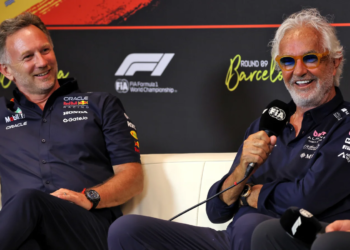McLaren Team Principal Andrea Stella deserves immense credit for “unleashing the awesome talent” based within the side’s ranks, according to CEO Zak Brown.
Andreas Seidl’s departure over the winter to take up a role at the Sauber Group ahead of its transition into Audi saw Stella promoted into the role of team boss at McLaren.
Having begun the year struggling with an underdeveloped launch version of its MCL60 charger, McLaren has since become a regular podium contender with the introduction of a revised car back in July.
The Woking-based camp has gone from only scoring a paltry 17 points across the first eight races to 155 across the previous eight, along with five podiums – including a double top-three finish last time out at Suzuka.
Brown has lavished praise on the role Stella has played in transforming McLaren’s fortunes in his debut team principal role.
“It’s the same people that produced our car in Bahrain that are producing this great racing car now,” Brown said during the Japanese Grand Prix weekend.
“I think you got to give a lot of credit to [team boss] Andrea Stella and his whole leadership team and his leadership style, because he’s really unleashed the awesome talent that we’ve had in the factory.
“It’s the same people – so great leadership, great teamwork, collaboration, communication, and just hats off to everyone back to the factory and at the track for the awesome work they’ve done.
“They’ve kept their head down and just gotten on with it. We need to keep pushing.”

McLaren’s remarkable turnaround has witnessed the team pull well clear of Alpine in the Constructors’ Championship and rapidly reel in a flailing Aston Martin squad.
The Silverstone entity has been unable to maintain the form that enabled it to notch five podiums in the first six races, allowing McLaren to close to within 49 points.
But despite Lando Norris asserting that McLaren can overhaul Aston Martin, Stella has downplayed the tightening battle for fourth, clarifying that his team is fixated on maximising the potential of its package.
“The way we look at things is when you lead a team, or when you are part of the team, you don’t want to get overwhelmed by our need to do that,” Stella explained.
“You almost need to focus on what’s the next right step to do. So our narrative, our message, is always about how we need to out-develop our competitors. We need to make sure we don’t have reliability problems. And we need to operate well on the track to exploit our competitiveness.
“Then we’ll see where we are at the end of the race, at the end of the championship, if that makes sense. It’s just how you approach things when you are inside a team.
“Because, otherwise, if you just think about your target, targets are good for a conversation. But it’s not good for doing the target.”










Discussion about this post